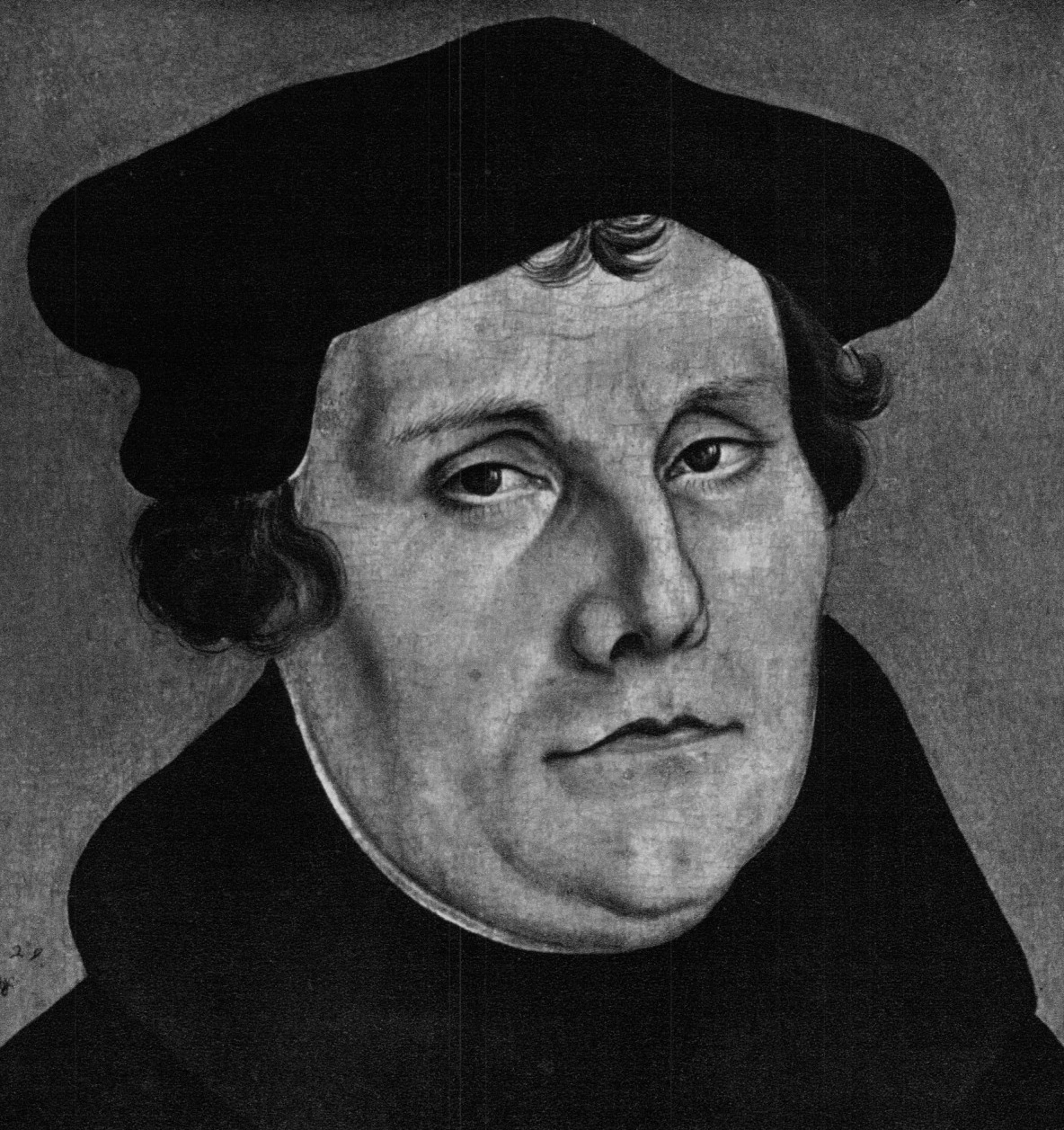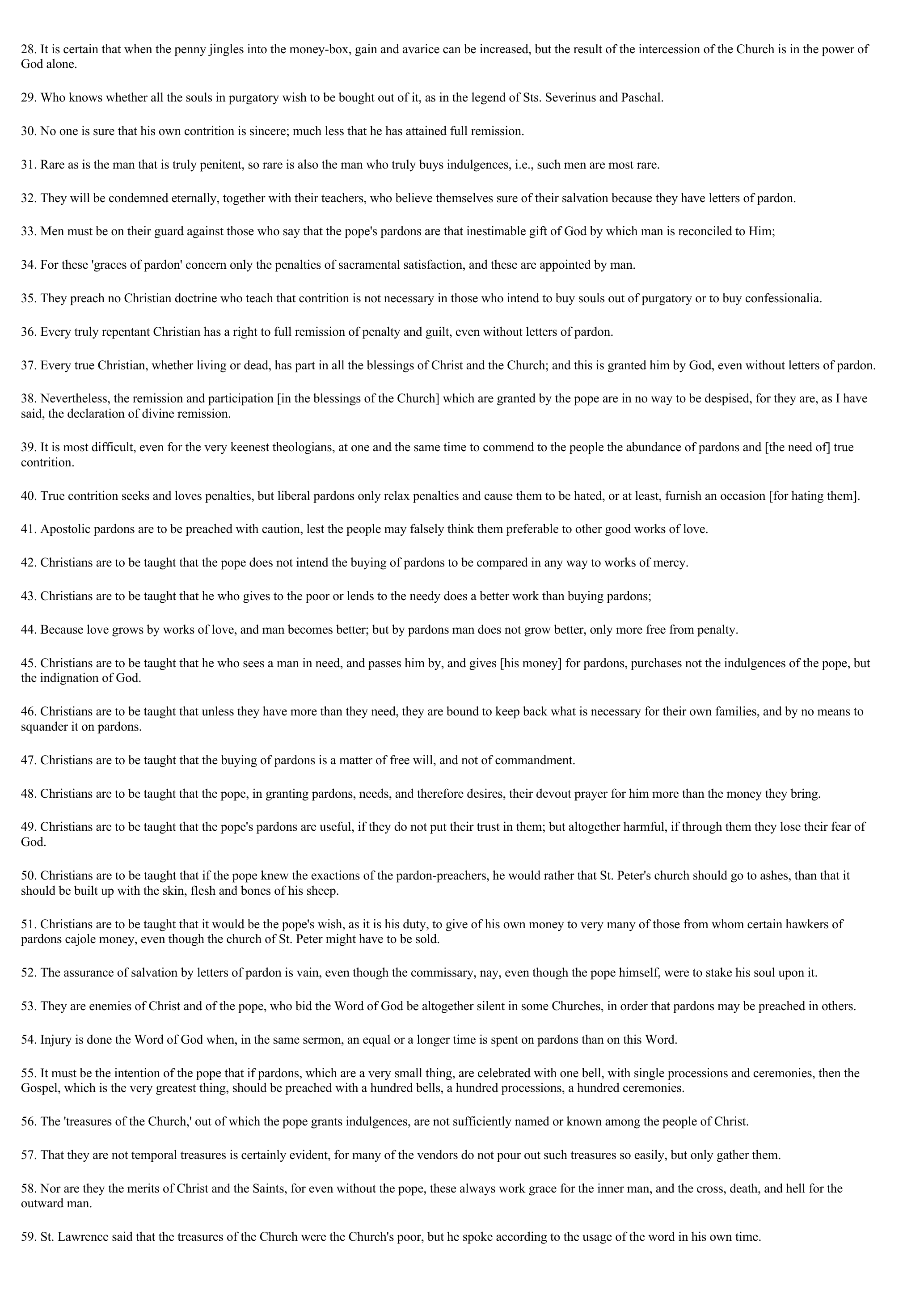Luther's Ninety-Five Theses German theologian Martin Luther publicly condemned the practice of buying indulgences on October 31, 1517.
Publié le 26/05/2013
Extrait du document


«
28.
It is certain that when the penny jingles into the money-box, gain and avarice can be increased, but the result of the intercession of the Church is in the power ofGod alone.
29.
Who knows whether all the souls in purgatory wish to be bought out of it, as in the legend of Sts.
Severinus and Paschal.
30.
No one is sure that his own contrition is sincere; much less that he has attained full remission.
31.
Rare as is the man that is truly penitent, so rare is also the man who truly buys indulgences, i.e., such men are most rare.
32.
They will be condemned eternally, together with their teachers, who believe themselves sure of their salvation because they have letters of pardon.
33.
Men must be on their guard against those who say that the pope's pardons are that inestimable gift of God by which man is reconciled to Him;
34.
For these 'graces of pardon' concern only the penalties of sacramental satisfaction, and these are appointed by man.
35.
They preach no Christian doctrine who teach that contrition is not necessary in those who intend to buy souls out of purgatory or to buy confessionalia.
36.
Every truly repentant Christian has a right to full remission of penalty and guilt, even without letters of pardon.
37.
Every true Christian, whether living or dead, has part in all the blessings of Christ and the Church; and this is granted him by God, even without letters of pardon.
38.
Nevertheless, the remission and participation [in the blessings of the Church] which are granted by the pope are in no way to be despised, for they are, as I havesaid, the declaration of divine remission.
39.
It is most difficult, even for the very keenest theologians, at one and the same time to commend to the people the abundance of pardons and [the need of] truecontrition.
40.
True contrition seeks and loves penalties, but liberal pardons only relax penalties and cause them to be hated, or at least, furnish an occasion [for hating them].
41.
Apostolic pardons are to be preached with caution, lest the people may falsely think them preferable to other good works of love.
42.
Christians are to be taught that the pope does not intend the buying of pardons to be compared in any way to works of mercy.
43.
Christians are to be taught that he who gives to the poor or lends to the needy does a better work than buying pardons;
44.
Because love grows by works of love, and man becomes better; but by pardons man does not grow better, only more free from penalty.
45.
Christians are to be taught that he who sees a man in need, and passes him by, and gives [his money] for pardons, purchases not the indulgences of the pope, butthe indignation of God.
46.
Christians are to be taught that unless they have more than they need, they are bound to keep back what is necessary for their own families, and by no means tosquander it on pardons.
47.
Christians are to be taught that the buying of pardons is a matter of free will, and not of commandment.
48.
Christians are to be taught that the pope, in granting pardons, needs, and therefore desires, their devout prayer for him more than the money they bring.
49.
Christians are to be taught that the pope's pardons are useful, if they do not put their trust in them; but altogether harmful, if through them they lose their fear ofGod.
50.
Christians are to be taught that if the pope knew the exactions of the pardon-preachers, he would rather that St.
Peter's church should go to ashes, than that itshould be built up with the skin, flesh and bones of his sheep.
51.
Christians are to be taught that it would be the pope's wish, as it is his duty, to give of his own money to very many of those from whom certain hawkers ofpardons cajole money, even though the church of St.
Peter might have to be sold.
52.
The assurance of salvation by letters of pardon is vain, even though the commissary, nay, even though the pope himself, were to stake his soul upon it.
53.
They are enemies of Christ and of the pope, who bid the Word of God be altogether silent in some Churches, in order that pardons may be preached in others.
54.
Injury is done the Word of God when, in the same sermon, an equal or a longer time is spent on pardons than on this Word.
55.
It must be the intention of the pope that if pardons, which are a very small thing, are celebrated with one bell, with single processions and ceremonies, then theGospel, which is the very greatest thing, should be preached with a hundred bells, a hundred processions, a hundred ceremonies.
56.
The 'treasures of the Church,' out of which the pope grants indulgences, are not sufficiently named or known among the people of Christ.
57.
That they are not temporal treasures is certainly evident, for many of the vendors do not pour out such treasures so easily, but only gather them.
58.
Nor are they the merits of Christ and the Saints, for even without the pope, these always work grace for the inner man, and the cross, death, and hell for theoutward man.
59.
St.
Lawrence said that the treasures of the Church were the Church's poor, but he spoke according to the usage of the word in his own time..
»
↓↓↓ APERÇU DU DOCUMENT ↓↓↓
Liens utiles
- Martin Luther I INTRODUCTION Martin Luther (1483-1546), German theologian and religious reformer, who
- La fête de la Réformation En souvenir de l'affichage des 95 thèses de Martin Luther, dénonçant le trafic des indulgences.
- Does the "access" or "service" model that has replaced the "ownership" model in the business practice of companies such as Kindle/Amazon take fairly into account the interests and/or rights of the consumers?
- TRAITÉ DU SERF ARBITRE de Martin Luther (résumé et analyse)
- SERF ARBITRE (DU), Martin Luther (résumé & analyse)

































